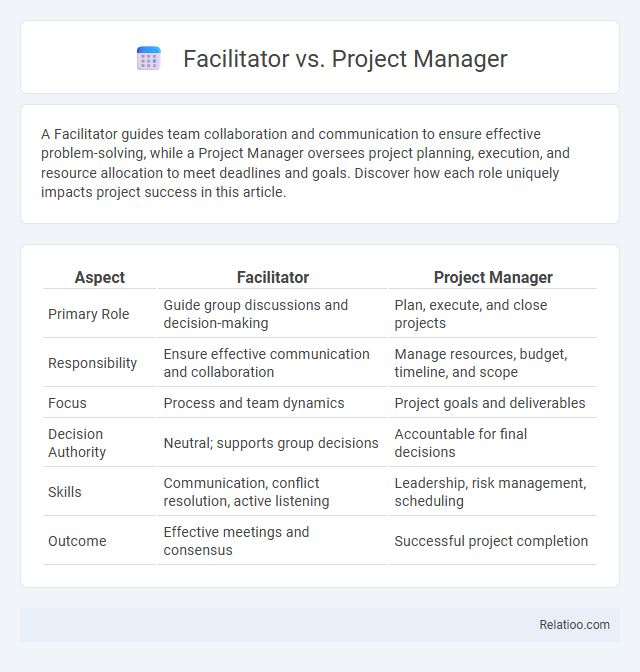A Facilitator guides team collaboration and communication to ensure effective problem-solving, while a Project Manager oversees project planning, execution, and resource allocation to meet deadlines and goals. Discover how each role uniquely impacts project success in this article.
Table of Comparison
| Aspect | Facilitator | Project Manager |
|---|---|---|
| Primary Role | Guide group discussions and decision-making | Plan, execute, and close projects |
| Responsibility | Ensure effective communication and collaboration | Manage resources, budget, timeline, and scope |
| Focus | Process and team dynamics | Project goals and deliverables |
| Decision Authority | Neutral; supports group decisions | Accountable for final decisions |
| Skills | Communication, conflict resolution, active listening | Leadership, risk management, scheduling |
| Outcome | Effective meetings and consensus | Successful project completion |
Understanding the Roles: Facilitator vs Project Manager
A facilitator guides group discussions to ensure effective communication and collaboration, while a project manager oversees the planning, execution, and completion of projects, focusing on scope, time, and budget constraints. Facilitators remain neutral to encourage participation and consensus, whereas project managers hold decision-making authority and manage resources to achieve project objectives. Ground rules establish agreed-upon behaviors that support productive interactions, benefiting both facilitators and project managers in maintaining structured and respectful environments.
Core Responsibilities of a Facilitator
A Facilitator's core responsibilities include guiding group discussions, ensuring equal participation, and fostering collaborative decision-making to achieve meeting objectives efficiently. Unlike a Project Manager who focuses on planning, executing, and delivering projects on time and budget, a Facilitator emphasizes process management and communication within teams. Establishing Ground Rules is a key facilitation task that helps create a respectful and productive environment, enabling Your team to stay focused and work cohesively.
Key Duties of a Project Manager
A Project Manager primarily oversees project planning, execution, and delivery, ensuring alignment with budget, scope, and timeline constraints. They coordinate cross-functional teams, manage risks, and facilitate communication to keep your project on track and stakeholders informed. Unlike a Facilitator who guides group discussions or Ground Rules that establish behavioral standards, the Project Manager holds accountability for meeting project objectives and resource management.
Essential Skills for Facilitators
Facilitators excel in essential skills such as active listening, conflict resolution, and guiding group dynamics to ensure productive collaboration, distinguishing them from project managers who primarily focus on planning, execution, and meeting deadlines. While project managers oversee project scope and resources, facilitators create an inclusive environment by setting clear ground rules that foster open communication and equal participation. Your ability to implement effective ground rules is crucial for facilitators to maintain focus and achieve group consensus.
Vital Skills for Project Managers
Vital skills for project managers include effective communication, leadership, and conflict resolution, which overlap significantly with a facilitator's role in guiding team collaboration and maintaining focus on goals. Project managers must also establish clear ground rules to ensure accountability, streamline decision-making, and foster a productive environment that supports project success. Your ability to balance these skills enhances team dynamics and drives project outcomes efficiently.
Typical Work Scenarios: Facilitator in Action
Facilitators excel in guiding group discussions, resolving conflicts, and ensuring inclusive participation during meetings, workshops, or strategy sessions, allowing your team to collaboratively generate ideas and reach consensus. Unlike project managers who focus on planning, scheduling, and task execution, facilitators concentrate on process management and communication flow to maintain group dynamics and productivity. Ground rules established by the facilitator help create a safe environment, promoting respect and active listening for effective decision-making in various work scenarios.
Real-World Applications: Project Manager at Work
A Project Manager coordinates resources, timelines, and stakeholder communication to ensure project goals are met efficiently, while a Facilitator guides team discussions to foster collaboration and problem-solving without direct decision authority. Ground rules set clear expectations for behavior and processes during meetings and project execution, enhancing productivity and reducing conflicts. You can improve team dynamics and project outcomes by understanding how these roles and rules interact in real-world project management scenarios.
Collaboration and Team Dynamics
Facilitators enhance collaboration by guiding group interactions and ensuring balanced participation, while project managers focus on planning, executing, and delivering project objectives within scope, time, and budget constraints. Ground rules establish a shared framework for behavior and communication, promoting mutual respect and effective teamwork essential for positive team dynamics. Combining facilitation techniques, project management skills, and agreed-upon ground rules fosters a collaborative environment that drives team cohesion and productivity.
Decision-Making Approaches Compared
Facilitators guide group decision-making by encouraging open dialogue and consensus-building, whereas project managers prioritize structured decision frameworks to align with project goals and timelines. Ground rules establish a common framework for decision-making by defining acceptable behaviors and processes, ensuring clarity and consistency in group interactions. Comparing these approaches reveals facilitators emphasize collaboration, project managers focus on control and accountability, and ground rules provide behavioral boundaries essential for effective decision-making.
Choosing the Right Role for Your Project
Choosing the right role for your project involves understanding the distinct functions of a facilitator, project manager, and ground rule enforcer. A project manager oversees timelines, resources, and deliverables, ensuring that your objectives are met efficiently, while a facilitator focuses on guiding team discussions and fostering collaboration. Ground rules establish the behavioral framework to maintain order and productivity, making it essential to align these roles with your project's specific needs for success.

Infographic: Facilitator vs Project Manager
 relatioo.com
relatioo.com